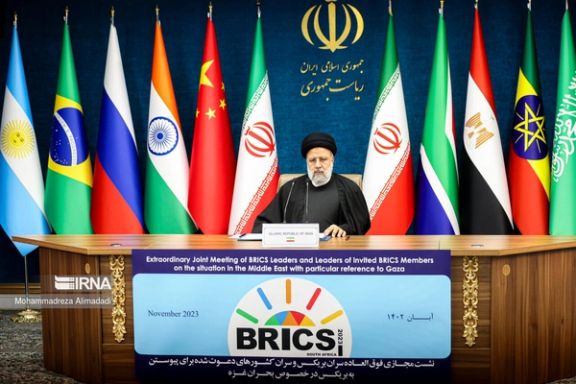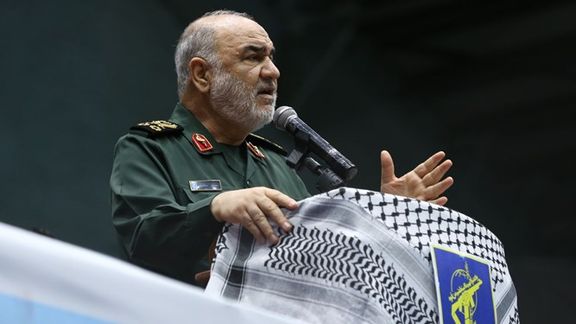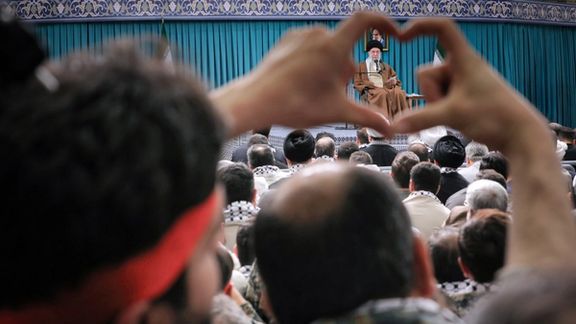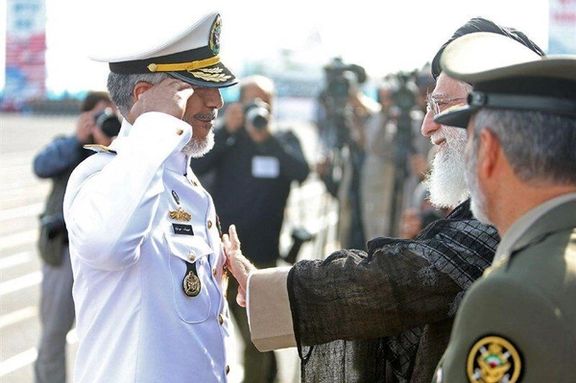Iran’s Raisi Opts Out Of COP28 Due To Israeli Presence

Iran's president claims he will not attend the United Nations Climate Change Conference (COP28) in Dubai, citing the presence of his Israeli counterpart.

Iran's president claims he will not attend the United Nations Climate Change Conference (COP28) in Dubai, citing the presence of his Israeli counterpart.
Israeli president Isaac Herzog will be in the United Arab Emirates along with around 140 other world leaders for the world's biggest climate summit which begins Friday, to be opened by Britain's King Charles.
Fars News Agency, known for its proximity to the Islamic Revolutionary Guard Corps (IRGC), reported on Thursday that Raisi will not only be absent from the conference but will also not have a representative attending on his behalf.
According to the report, Iran will only participate in the conference at the ministerial level, with the representation led by the minister of energy.
The UAE and Israel normalized relations during the presidency of Donald Trump in the United States when in 2020 the Abraham Accords opened diplomatic ties along with other Arab nations such as Bahrain.
During Herzog's inaugural visit to the UAE last year, the Iran-backed Houthis in Yemen sent a ballistic missile to the Persian Gulf state amidst a period of attacks which killed three. The missile was intercepted by the UAE.
The Houthis' military spokesman said they fired Zulfiqar missiles at Abu Dhabi and launched drones at Dubai.

As the Israel-Hamas truce sees a one-day extension, Iran has issued a renewed threat of war against the United States and Israel.
"We fight against America, Israel, and anyone who challenges the grandeur of the Islamic Republic," said the Commander of Iran's Islamic Revolutionary Guard Corps, Hossein Salami on Thursday, repeating a well-trodden narrative against Iran's archenemies.
It is the latest rally cry amidst the war between Israel and Hamas, initiated by the Hamas invasion on October 7, which resulted in at least 1,200, mostly civilians losing their lives, and an additional 240 taken hostage. Retaliatory attacks have left over 15,000 dead in Gaza, with hundreds of thousands displaced.
The current ceasefire, initially set to expire, has been extended by one day, meaning a further 10 hostages and three bodies will be returned to Israel and around 30 more Palestinian prisoners in Israeli jails released. The extension comes after Israel received a list of women and children for potential release, according to the Israeli government.
Iran, a long-time supporter of Hamas both financially and militarily, has refrained from direct involvement in the Gaza war beyond its leaders and commanders' rally cries and incitement. However, its proxy forces continue attacks, citing perceived US support for Israel. At least 60 attacks on US forces have taken place since October 7, and Israel has come under attack from proxy militias in Yemen, Lebanon, Syria and Iraq.
Critics of US President Joe Biden argue that his Iran policy has emboldened the regime and its proxies, who perceive minimal consequences for their actions. While the US military has launched less than a handful of retaliatory attacks in Syria and Iraq, Iran's Revolutionary Guard, controlling proxy forces, has not been targeted.

Police in Tehran have been impounding cars in the latest crackdown against ongoing hijab violations.
Iranian officials confirmed the issuance of police warnings through text messages, alerting citizens to the imminent seizure of vehicles for failing to adhere to compulsory hijab rules. The police directive reportedly extends to over a million citizens, with hundreds of cars confiscated and temporarily prohibited from use.
Amidst a growing crackdown on hijab defiance, Iranian parliamentarians have expanded the government's Hijab and Chastity bill. The proposed legislation, seeking stricter penalties for hijab infractions, faces widespread criticism from human rights groups.
The intensified enforcement of hijab regulations follows protests that have swept across Iran since the death of Iranian-Kurd Mahsa Amini last year. Amini's arrest in Tehran, allegedly for breaching the Islamic republic’s mandatory hijab, ignited the worst uprising of recent history.
Women across the country have been defying the mandatory hijab which has been met with a heavier presence of hijab enforcers in public spaces such as subway stations. Additionally, surveillance cameras have been installed to identify and apprehend individuals violating hijab regulations.

Iran's Assembly of Experts, tasked with selecting a successor for the 84-year-old Supreme Leader Ali Khamenei, is reportedly in the process of determining a deputy for him.
The post, initially created following the Islamic Republic's inception, was abolished in 1989 after the fallout between the first leader, Ayatollah Ruhollah Khomeini, and the country's inaugural deputy supreme leader, Ayatollah Hossein Ali Montazeri, who remained under house arrest until his death in 2009.
The absence of a designated successor since 1989 poses a potential threat to Iran's stability, both before and after Khamenei's eventual passing.
Ayatollah Rahim Tavakol, a member of the Assembly of Experts, disclosed on November 28 that a committee within the Assembly has been assigned the task of appointing a deputy supreme leader. While the matter was not discussed in the recent Assembly meeting, Tavakol emphasized the confidentiality of the committee's work, stating that only its members, including himself and the Assembly chairman, have knowledge of the selected candidates.

He said, "no one other than the committee members including myself and the chairman of the Assembly know the names of those who have been selected as possible deputy supreme leader. So, there was no discussion about this at the Assembly meeting."
Tavakol made it clear that "what the committee does and whom it choses is a secret." Although he tried his best to be secretive about the matter, when reformist Jamaran News website speculated that President Ebrahim Raisi and Tehran Friday Prayers Leader Ahmad Khatami are the other members of the committee, Tavakol said: "Yes. And I am on the committee too."
He clarified that Khamenei is the sole individual privy to the names of the potential nominees for the deputy supreme leader role. The committee, known as "The Committee to Determine the Next Leader," consists of only three members, raising questions about the roles of the remaining 88 members of the Assembly of Experts.

Meanwhile, responding to criticisms about the Assembly of experts presenting reports of its activities to Khamenei rather than keeping checks and balances on the leader's performance as stipulated by Iran's Constitution, he said the Assembly does not interfere with the leader and the institutions that operate under his aegis, nonetheless, there is a two-way relationship between the leader and the Assembly of Experts.
Last week, former President Hassan Rouhani openly spoke about the possibility of Khamenei's death and the importance of the issue of succession. He said, "every day brings us closer to the day of his death although we wish him a long life."
Despite frequent expressions of support by Khamenei and his loyalists for Hamas since the start of the Gaza war, the Iranian government has decided not to get directly involved and assist its proxy militarily. Khamenei has even softened his position somewhat regarding Israel, showing his overall weak position. There have also been concerns about his health after his meeting with athletes last week, during which he looked and sounded frail.
The interview by Tavakol, could be an attempt to prepare the mood for an announcement about the next leader.
One possible solution is to designate a collective body. However, since 1988, Assembly of Experts has opposed a collective leadership by a group of clerics, as conflict of interests could drag the country into chaos. Consequently, individual leadership by figures like Khamenei's son Mojtaba, President Ebrahim Raisi, and former President Hassan Rouhani are more likely choices, despite their diminished popularity. The ultimate decision, however, remains uncertain, as the people's desires, if considered, present an entirely different narrative.
There have been numerous calls by former regime supporters in recent years to drastically alter the constitution and either eliminate the position of the Supreme Leader or reduce its power. Popular protests since 2017 have also shown a growing public rejection of Khamenei’s rule and clerical domination.

Iran's Shargh newspaper's economic editor, Maryam Shokrani, is set to appear in court in December following her coverage on the death of a teenage girl in the Tehran subway.
Shokrani revealed the legal summons via X, citing allegations of "spreading lies and propaganda against the system” after the story broke of Armita Geravand, 16, dying after being in a violent incident with morality police.
Like Mahsa Amini, the cause of her death while in morality police custody was never revealed by authorities though it is believed she fell into a coma after falling during the clash on the subway.
In a recent Instagram post on November 22, Shokrani expressed her dismay, stating that the case was forwarded to Branch 1058 of the Culture and Media Prosecutor's Office without proper investigation, and she had not been given an opportunity to present her defense.
This marks the second legal case filed against Shokrani in the past few weeks. Initially, she had been summoned to Branch 16 of the Tehran Culture and Media Prosecutor's Office, unaware of the complaint's subject matter.
The two journalists who reported the death of Amini were also imprisoned last month as the regime continues its crackdown on dissident voices.
Iran has arrested at least 79 journalists since the uprising of September last year, according to Reporters Without Borders.

Despite Western arms embargoes, an Iranian army commander says Tehran has achieved self-sufficiency to export military equipment amidst global sanctions.
The announcement by Rear Admiral Habibollah Sayyari, the Coordinating Deputy of the Islamic Republic's Army shows the disregard for arms embargoes imposed by the United States and the European Union, the military chief saying on Thursday that "the capabilities of the Islamic Republic of Iran, especially in the field of military equipment, have grown and developed."
The United Nations Security Council's Resolution 2231 enforced a conventional arms embargo on Iran which expired in October 2020. Despite former President Donald Trump's efforts to extend the embargo after the US withdrawal from the nuclear deal in 2018, the Security Council rejected the proposal, allowing Iran to resume arms exports, but a full embargo from the EU, from 2007, remains in place.
The expiration of UN sanctions on Iran's missile program in October has also raised concerns about the accelerated proliferation of potentially dangerous weapons. Iran is now free to sell its drones, ballistic missiles, and related long-range strike technologies to its anti-Western partners and clients and can also procure technology for further development.
The lifting of sanctions provides Iran with the opportunity to generate revenue from missile sales, potentially using the profits to finance militant and terror proxies in the Middle East.